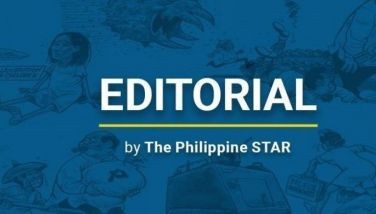Where in the world is the Philippines? BBM tells us

The best and most comprehensive foreign policy speech ever delivered by a Filipino leader is that of President Ferdinand “Bongbong” Romualdez Marcos Jr. at the 21st Shangri-La Dialogue in Singapore on May 31, 2024.
Before the world’s best, brightest and most influential leaders, thinkers and strategists, Marcos Jr., in his inimitable robust rhetoric, defined the Philippines archipelago and the country’s place in history and in world affairs and how that historic role helped contribute to the shaping of this country’s foreign policy, the foreign policies of its neighbors, and to the peace, stability, and prosperity of the world’s largest and richest region.
Asia has a third of the world’s land area, 6o percent of its population, and 60 percent of its GDP and is the world’s richest and fastest growing region.
The Philippines is Asia’s first republic, in 1989. It pioneered a democracy-based Constitution, in 1935.
Manila also taught the world how to treat a foreign invader – finish him off, exactly what Filipino tribal chieftain Lapulapu did to Magellan and his five boatloads of invaders in 1521. So complete and ruthless was that conquest Magellan’s body was never found.
Since Spain was the greatest naval power in the 16th century, I liken Lapulapu’s victory as equivalent today, to a small Filipino tribe defeating the US Seventh Fleet, using nothing more than crude bows, arrows and knives. In Balangiga, Samar in 1901, 34 Filipino guerillas, dressed as women, dealt the US Army its first major defeat in a foreign war, killing 54 invading soldiers.
Filipinos know how to handle invaders, by force of arms or by force of international law.
In Singapore, itself a victim of European colonialism, Marcos educated his audience on the historical basis for its claim of sovereignty and territorial integrity.
The 1935 Constitution “defined our territory in accordance with the international treaties that became the basis of our archipelagic unity.”
These are the December 1898 Treaty of Paris and the Treaty of Washington, both between Spain and the US.
The Treaty of Paris ceded to the US the Philippines whose territory was defined in Article III, basically the Philippine territory today. The US paid Spain $20 million, with Cuba as a freebie.
The Treaty of Washington of 1890 clarified Article III of the Treaty of Paris on what constitutes the archipelago called the Philippine islands and would include the islands of Cagayan, Sulu, and Sibutu and their dependencies (which means Sabah). The US paid Spain $100,000 for the clarification.
In 1982, the Philippines, thru then Foreign Minister Arturo M. Tolentino, helped advance the archipelagic doctrine before the world. “This doctrine has been has been enshrined in the 1982 United Nations Convention on the Law of the Sea or the UNCLOS,” said Marcos Jr., adding, “this has been inscribed in Article I of our Constitution.”
The President will soon sign “our Maritime Zones Law which will clarify the geographic extent of our maritime domain.” “In the West Philippine Sea,” he explained, “we are on the frontlines of efforts to assert the integrity of the UNCLOS as a Constitution of the Oceans.”
“We have defined our territory and our maritime zones in a manner befitting a responsible and law-abiding member of the international community. We have submitted our assertions to rigorous legal scrutiny by the world’s leading jurists,” Marcos said.
Citing the 1982 UNCLOS and the 2016 Arbitral Award, the President asserted “our clear moral ascendancy” and “the strength to do whatever it takes to protect our sovereign home – to the last square inch, to the last square millimeter.” Marcos boomed:
“The life-giving waters of the West Philippine Sea flow in the blood of every Filipino. We cannot allow anyone to detach it from the totality of the maritime domain that renders our nation whole.” (Thunderous applause). “I do not intend to yield. Filipinos do not yield.”
The President said 79 years of the rules-based order “have allowed our region to flourish. The stability and predictability it has engendered (have) been crucial to the success of the stories of our region—be it the postwar revival of Japan, the economic miracles of Korea and in Southeast Asia, (or) the rise of China and India.”
Marcos recited treaties and agreements the Philippines signed to promote peace, stability, and prosperity—the 1945 United Nations in San Francisco, the 1967 Bangkok Agreement creating ASEAN, the 1982 and Manila Declaration on the Peaceful Settlement of Disputes.
On the UN, Marcos said “we must reject unjust narratives that seek to subsume distinct national interests (into) so-called ‘major country’ dynamics, which seek to impose a hierarchy among nations.”
He urged a return to the Bangkok ASEAN Agreement “to build a rules-based, people-oriented, and people-centered regional community.”
“Let us return as well to Manila and reaffirm our common understanding of how international law governs the peaceful settlement of disputes.”
“From the achievements of San Francisco, Bangkok, and Manila, we (ASEAN) as a region draw out abiding compass,” Marcos said, as he stressed the importance of ASEAN. “We are not mere bystanders to unfolding world events. We are the actors that drive those events.”
The President conceded “China’s determining influence over the security situation and the economic evolution of this region as a permanent fact,” but stressed “the stabilizing presence of the United States is crucial to regional peace.”
Marcos urged China and the US to manage their rivalry “in a responsible manner.” That means the two powers must reverse “the recent increase in nuclear stockpiles and alleviate the risks of nuclear conflict” and “extinguish the last vestiges of the Cold War.”
“Peace, security and stability are the business of all countries,” the President said. “The future of our region will be driven, not by one, or two powerful countries, but by all of us.”
* * *
Email: [email protected]
- Latest
- Trending




























